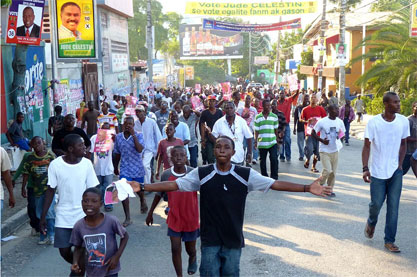Haiti’s presidential and parliamentarian elections on November 28 were anything but predictable. Despite panic over the cholera outbreak and ensuing clashes between protesters and UN soldiers, the elections proceeded on schedule. One million Haitians, or about 10 percent of the population, braved chaotic polling stations to vote—a low turnout by any standard.
Another surprise came from Jude Celestin, President René Préval’s handpicked candidate. Despite a poor showing during the campaign, the final election results put Celestin in second place behind former first lady and current university professor, Mirlande Manigat. That means Celestin surprisingly qualified for a runoff in mid-January.
Yet more shocking than Celestin’s success was Michel “Sweet Micky” Martelly’s failure to qualify. Despite his reputation for suggestive lyrics and performances, Martelly ran a brilliant campaign and was the favorite among the urban poor. While Manigat earned a wide margin of victory with 31.4 percent of the vote, Celestin (22.5 percent) only narrow beat out Martelly (21.8 percent) by 6,845 votes.
Almost immediately after the results were announced, hundreds of thousands of Haitians took to streets in violent protest, many of whom were supporters of Martelly. Unusually, the protests were not limited only to the Port-au-Prince metropolitan area. There were reports of unrest in Cap Haitien, Les Cayes and other large cities.
The reason for the protests was clear: many Haitians suspect the government of stuffing ballots in favor Celestin, giving him 7,000 additional votes and inching him into second place over the popular Martelly.
But the elections were controversial from day one. Journalists and international observers chronicled widespread voter fraud and intimidation on Election Day. Even Celestin could not find his name on the ballot when he went to cast his vote. Countless voters interviewed said they traveled to at least four polling stations and still could not find their names on the voting rolls.
Boxes stuffed with ballots were photographed as they floated down rivers, and children played with discarded ballots as if they were toys.
The results were also deemed dubious by the U.S. embassy in Haiti, which called them inconsistent. “The United States, together with Haiti’s international community partners, stands ready to support efforts to thoroughly review irregularities in support of electoral results that are consistent with the will of the Haitian people,” the U.S. embassy said in a statement.
Now there are negotiations for the United States to monitor a recount that would lend credibility to the results. Yet there is no guarantee that the Haitian people, who have been deeply disenchanted with Préval for most of his tenure, will be convinced. Manigat and Martelly have both publicly stated that they would not honor a recount, even if it were administered by the United States. Ironically, Celestin, who has attracted the most suspicion domestically and internationally, is the only candidate willing to participate in a recount. How Haiti has reached this impasse, despite $30 million spent to organize the elections, has confounded local and international observers. It is crucial that a legitimately elected government take power so that billions of dollars in pledged aid can be properly channeled.
Préval, who cannot run for re-election because of term limits, has been said to fear exile or imprisonment if a hostile opposition candidate win the presidency. So it appears Préval has manipulated the elections and their results so that his handpicked candidate or Manigat, a constitutionalist who would protect him, will win the presidency.
The scenario that is currently unfolding around the elections is eerily similar to Préval’s ascendancy to the presidency. In 2006, Haiti’s electoral council, the CEP (Conseil Electoral Provisoire), had tampered with the results and people took to the streets to demand a recount. The end result showed that Préval garnered more than 50 percent of the vote and a runoff was not necessary.
During Préval’s first presidency [1996-2001], he was largely viewed as a puppet of his predecessor and successor, Jean Bertrand Aristide. He even made history as being the first Haitian president to remain in the country after his term ended, and eventually got re-elected president in 2006.
But Préval’s reign was uneven at best, with the low point coming in the days following the January 12 earthquake. During the aftermath, Préval was widely criticized for not being the strong leader that Haiti so desperately needed. The disaster left than more than 200,000 Haitians dead, 1.5 million homeless and 40 percent of the capital destroyed. Unfortunately, almost a year later, little in Port-au-Prince has changed.
He also earned the ire of the population for his failure to pave the way for Aristide’s return from exile in South Africa. At the time, Haitians thought that a vote for Préval was a vote for the return of Aristide, who remains deeply popular in Haiti five years after his ouster.
So now the tables have turned and the pressure is on Préval to deliver another outcome. People have vowed to continue their protest until justice is served—in whatever form it may come. Although their anger may be focused on Martelly being cheated out of a run-off spot, the violence also represents a cry of frustration from a people who have seen their pride and dignity trampled over and over, especially when it comes to elections.







